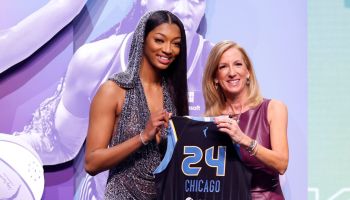New Muslim Cool comes at a time when daily we observe in our national culture old-guard gatekeepers (can you say Dick Cheney?) who work tirelessly to impose on the younger generation a shared American identity that is dated, simple, and in white and black. The magic of Jennifer Maytorena Taylor’s important new film, which recently aired on PBS, is found in its ability to provide a bird’s eye view of a freshly minted generation of Americans. Fighting against being defined by America’s bygone eras, New Muslim Cool points us toward a more complicated future.
It’s a journey full of collisions-mainly because the very act of shining a spotlight on the ways race, politics, religion and generational rifts have evolved, something that Taylor does quite well, is a process that slowly gleans viewers from the self-identity America has for decades projected as status quo to the world. Welcome to a nation at the crossroads between old and new.
Thank goodness, this is the story of the new America that is unfolding-the one that young Americans across traditional divides are claiming everyday as their own.
Enter Hamza Perez. The film traces the ups and downs in the life of this northeastern seaboard urban native who is transplanted to post-industrial Pittsburgh for a new start, just as the US is on the verge of the most significant economic decline since the Great Depression. Perez, a Puerto Rican American hip-hop artist, is also Muslim. His conversion from Catholicism brings him face-to-face with what freedom of religion looks like in the throes of the war on terror. (One of the film’s high points is an unprovoked and unjustified FBI raid on Perez’s mosque).
Absent of his other identities, Perez’s story is incomplete: A street hustler turned anti-drug counselor; a father embarking on a second marriage; a young man struggling to find a workable definition of masculinity; an unsigned hip-hop artist for whom hip-hop culture provides both the foundation for his anti-drug advocacy and a medium through which he projects his new faith.
The film is most powerful when it meets all of these varying and sometimes overlapping identities head-on. It does this best when embracing the complexities of the three-part axis on which New Muslim Cool turns.
First, we are presented a vivid portrait of hip-hop through the eyes of an independent hip-hop artist (one-half of the rap duo Mujahideen Team) for whom a commercial industry record deal isn’t an end goal. And despite hip-hop’s decline as a cash cow for the record industry, the culture is revealed as an asset that enhances Perez’s life choices-just as it does for countless young Americans.
In a similar way, the film hones in on the intricacies behind the scenes of Latino America culture. Latino in this case, but not always, means Puerto Rican. And part of Perez’s personal and political struggle is a firm but nebulous connection to his island roots. As a second generation immigrant, Perez is at times at odds with his elders’ perspective (both his mom and grandmother), from his marriage to an African-American woman to his choice of religion.
Finally, the film’s treatment of Islam as an actual religion that guides practitioners on a spiritual path forces viewers to grapple with the last eight years of U.S. propaganda that portrays Islam as a religion of hate. That American homegrown Muslims, of Puerto Rican rather than Middle Eastern descent, are central in the film makes this crash course even more jarring.
U.S. anti-Muslim propaganda and religious profiling stands in sharp contrast to the more positive ideas of freedom of religion, free speech and other civil liberties that America once represented to the world. This is a significant part of the film’s message.
Considering the Pew Research Center survey released yesterday, which found that the generation gap between young and old Americans is the largest it’s been in the last 40 years, a film with such a message could be easily lost on either young or old. But New Muslim Cool is no ordinary film. In the tradition of Byron Hurt’s Hip-Hop: Beyond Beats and Rhymes (another PBS hit), this is a film that makes you want to do something.
To that end, New Muslim Cool will certainly speak directly to the heart of hip-hop audiences. As a result, across the nation young people will likely view it widely and dissect its strengths and weaknesses.
And if Taylor and Perez are correct about the nation’s future, babyboomers and World War II generationers must not only tune in, but they too should find it impossible to remain on the sidelines of a discussion so crucial to the future of our nation.
















